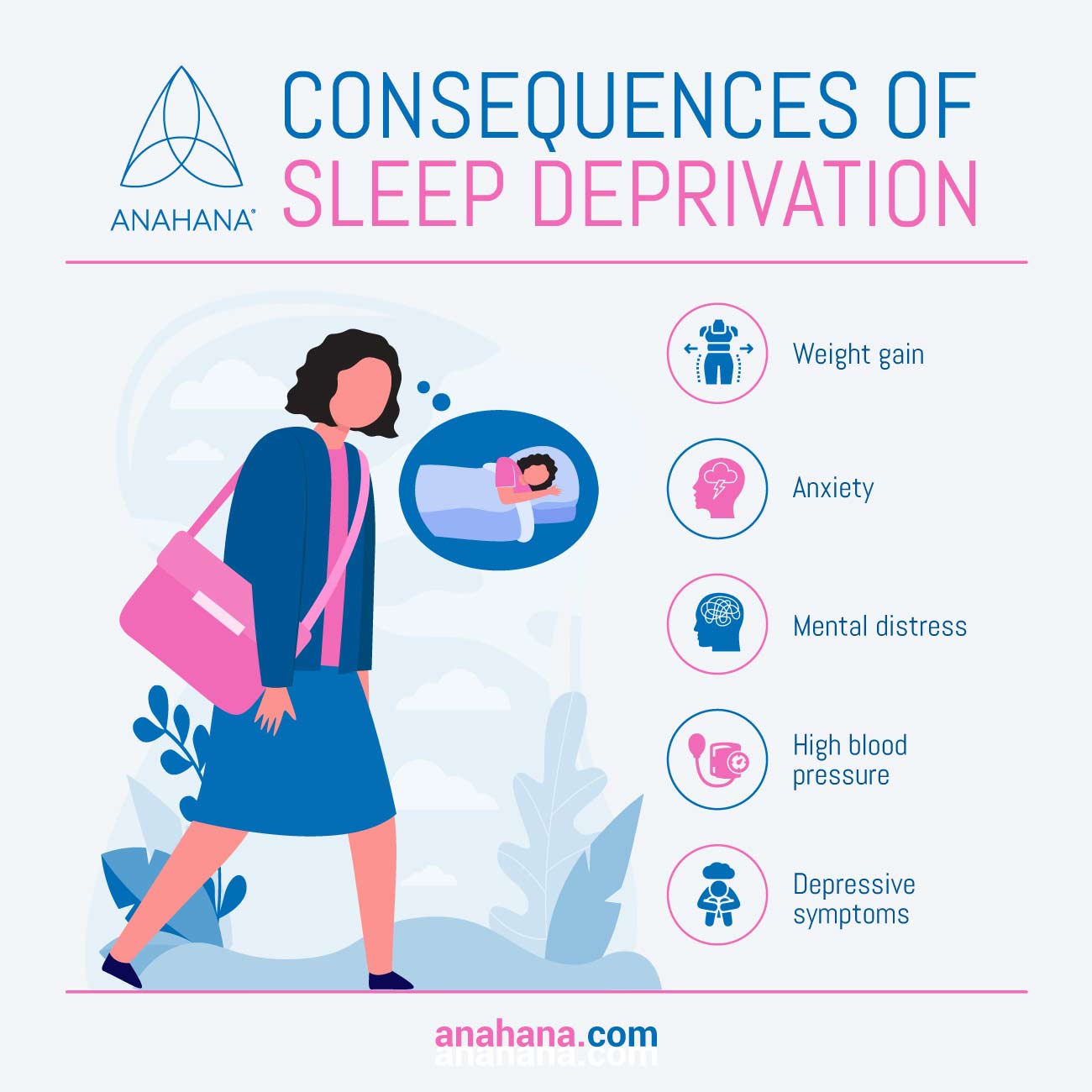
Table of Contents
Sleep deprivation occurs when an individual does not get enough sleep necessary for the human body to function properly. Without enough sleep, an individual's thoughts, mood and overall physical wellness are at risk.
Key Takeaways
- Definition: Sleep deprivation occurs when an individual does not get enough sleep or receive poor quality sleep.
- Causes: Various factors such as stress, lifestyle choices, and medical conditions.
- Symptoms: Includes fatigue, irritability, difficulty concentrating, inconsistent sleep patterns and weakened immune system.
- Effects: Chronic sleep deprivation can lead to serious health issues like cardiovascular diseases, diabetes, and mental health problems.
- Prevention: Emphasizes the importance of good sleep hygiene and lifestyle habits.
- Treatment: Options include lifestyle changes, medical interventions, and addressing underlying sleep disorders.
Sleep deprivation is when someone does not get enough sleep. It happens when a person cannot rest or stay asleep for the amount of time needed to feel awake and alert. Lack of sleep can cause tiredness, lack of focus, and other health problems.
Effects of Sleep Deprivation
Even small amounts of insufficient sleep have been shown to have severe short-term effects.
Often misconstrued, sleep deprivation does not necessarily mean lack of sleep due to the inability to fall asleep. An individual may clock the right amount of sleep at night but still experience sleep deficiency if these hours are fragmented or interrupted by tossing and turning.
Any lack of sleep, whether constantly waking up or difficulty falling asleep, will affect cognitive abilities, mood and physical well-being throughout the day. This will leave the person feeling and experiencing all the effects of sleep deprivation.
Not only does sleep deprivation affect the mind, but it also affects the body. A lack of sleep is known to leave people with daytime sleepiness and affect people’s balance and coordination, increasing the risk of accidents and injuries from various sources.
It will also weaken the immune system, increasing the risk of catching certain viruses responsible for the common cold and flu.
Common sleep deprivation effects include:
- cognitive functioning
- difficulty concentrating
- changes in mood
- increased risk for depression
- heightened stress levels
- impaired decision-making skills
- and decreased immune strength.
Sleep deprivation can affect certain cognitive functions that are essential to daily life. Losing sleep may leave an individual with symptoms like difficulties regarding concentration, creativity, problem-solving skills, and short-term memory. It will also cause unexpected moodiness, high emotions and a short temper.
Sleep Disorder
Many confuse and interchange the terms ‘sleep deprivation’ and ‘sleep disorder.’ Although similar, the two sleep problems have a few distinct factors.
Sleep deprivation is the action of not sleeping enough every night. This can be due to many factors, but the term only describes a lack of sleep or poor sleep hygiene.
Sleep disorders, however, are conditions that affect sleep quality and duration. These disorders come in all shapes and sizes and often cause sleep deprivation or lack of sleep.
Symptoms of Sleep Deprivation
Apart from not clocking enough hours of sleep or having severely fragmented sleep, insufficient sleep can leave individuals with many physical, mental and emotional symptoms throughout their day.
These symptoms are difficult to manage; getting that much-needed rest is the only relief.
Symptoms of sleep deprivation are the inability to fall asleep at night or difficulty falling asleep, as well as frequent sleep disturbances. These are often compared to and mistaken for insomnia symptoms.
Causes of Sleep Deprivation
There are many causes of sleep deprivation. Some are modifiable, while others are not. Poor sleep hygiene, lifestyle habits, work and social obligations, sleep disorders, and other medical conditions can lead to poor sleep and insufficient sleep.
Poor Sleep Hygiene
Sleep hygiene and healthy sleeping habits are the first steps to getting the eight hours necessary for physical and mental health.
Setting a sleep schedule, having a good sleeping environment, and having a set bedtime routine are just a few sleep habits that can help you get enough quality sleep and avoid sleep deprivation.
Sleeping eight hours every night can be difficult in such a busy world. Having the time for a full-time job, social life, family life, and personal self-care and hobbies can make maintaining a good sleep pattern challenging.
Making sure to schedule efficiently while planning for enough sleep when possible is the best way to avoid sleep deprivation.
Excessive Alcohol and Caffeine Consumption
Certain lifestyle habits can also get in the way of a good night’s sleep and lead to sleep deprivation.
Having alcohol or caffeine before bed, staying up late to finish an episode of a favorite show, or even something as simple as an inconsistent sleep schedule are all choices that might lead to acute sleep deprivation
Individuals can avoid or worsen sleep deprivation by making choices that benefit overall sleep quality.
Sleep disorders can play a huge role in the appearance of chronic sleep deprivation. Some examples of sleep disorders that can push back a bedtime are insomnia, circadian rhythm disorders, and restless legs syndrome.
These sleep disorders make it difficult for the individual to fall asleep at the proper time, making it challenging to maintain a proper sleep schedule and get the right amount of sleep.
Other sleep disorders may cause fragmented and interrupted sleep. Conditions such as obstructive sleep apnea and parasomnias cause disturbances in the sleep cycle, causing the individual to wake up tired, despite thinking they got a full night’s sleep.
Although the individual often forgets frequent but brief sleep disturbances, these wake-ups will still substantially impact a person’s physical and mental status in the morning.
Prevention of Sleep Deprivation
Preventative measures can also be identified by looking closely at the determined causes of sleep deprivation. Although somewhat preventative, most people will experience some degree of sleep deprivation at some point.
Due to causes being so common and natural in life, many people are not strangers to some of them.
Thankfully, one can still take steps to reduce the chance of developing this condition as much as possible or at least minimize the amount of sleep deprivation experienced.
Maintaining good sleep habits and proper sleep hygiene is a good first step to prevent sleep insufficiency. Having a consistent sleep schedule and making time for the recommended amount of sleep is key to prevention.
Good habits to promote sleep include avoiding electronics and blue lights, alcohol and big meals before bed, getting exercise and light exposure during waking hours and a relaxing sleep environment.
Including these factors in a sleep routine may reduce the chances of experiencing sleep deprivation.
Unfortunately, preventative measures are often ineffective when an underlying sleep disorder causes sleep deprivation.
When one suspects a sleep disorder, it is best to consult a healthcare provider or a sleep specialist to get the right treatment.
Treatment of Sleep Deprivation
Like prevention, treatment is often focused on the cause of sleep deprivation for the individual. It is necessary to have sleep deprivation diagnosed by a sleep specialist or healthcare provider to have a treatment plan.
For many, treatment is quite simple. It includes changing sleep habits and promoting sleep hygiene.
As mentioned above, having a relaxing sleep environment, sticking to a schedule, practicing relaxation techniques and avoiding anti-sleep habits can improve one’s quality of life through sleep.
This will not only lessen the effects of sleep deprivation but may also get rid of sleep insufficiency completely.
Unfortunately, it is not so simple for every sleep-deprived individual. Getting sufficient sleep may be more complex when the cause appears more stubborn. If all other options have been ineffective, trying pharmacological interventions to cure sleep deficiency may be necessary.
Sleep medicine can help a person fall asleep and stay asleep with increased ease or even reduce sleep-related behaviors responsible for severe sleep deprivation. Sleep medicine is often not the first treatment choice due to the dependence it may cause.
When sleep disorders are the underlying cause of sleep deprivation, it is necessary to treat this first. Each disorder has its treatment; sleep apnea often requires a CPAP machine, insomnia may require sleep medicine, etc. It is important to consult with a doctor to find an appropriate treatment for a specific sleep disorder.
Overall, treatment and management of sleep deprivation include a lot of trial and error. Finding what causes sleep deprivation to worsen and what makes it better can be challenging but ultimately rewarding once achieved.
Consequences of Chronic Sleep Deprivation

Recent research shows that chronic sleep deprivation causes many effects on long-term physical and mental health.
These studies suggest that getting less than seven hours of sleep per night for a long time can negatively impact the cardiovascular, endocrine, immune, and nervous systems.
Failure to get adequate sleep can result in:
- weight gain and obesity
- abnormal blood sugar levels and diabetes
- cardiovascular disease
- high blood pressure
- anxiety
- depressive symptoms
- mental distress
- and alcohol abuse.
It is shown that the greater the sleep deficiency, the greater the risks of consequences in the future.
Maintaining healthy sleep habits and getting adequate sleep can benefit one’s overall physical and mental health in the long run, leading to a long and healthy life.
Frequently Asked Questions
What are the signs of sleep deprivation?
Apart from the typical difficulties with falling asleep or staying asleep, sleep deprivation causes various signs and symptoms.
Both mentally and physically, the sleep-deprived will experience daytime sleepiness, difficulty with concentration and short-term memory, issues with problem-solving and creativity, high emotions and moodiness, and balance and coordination issues leading to frequent accidents.
How do I fix my sleep deprivation?
Sleep deprivation is fixed by first identifying the cause. Whether it be poor sleeping habits, an unorganized sleep-wake cycle, life choices and obligations or underlying sleep disorders, each cause has its treatment.
General tips to fix acute or chronic sleep deprivation include a regular sleep schedule, staying active during the day, limiting alcohol or caffeine intake before bed and consulting a physician to treat any sleep disorders.
References
Extent and Health Consequences of Chronic Sleep Loss and...
Sleep Deprivation: Causes, Symptoms, & Treatment
Sleep Deprivation: What It Is, Symptoms, Treatment & Stages
Disclaimer
The contents of this article are provided for informational purposes only and are not intended to substitute for professional medical advice, diagnosis, or treatment. It is always recommended to consult with a qualified healthcare provider before making any health-related changes or if you have any questions or concerns about your health. Anahana is not liable for any errors, omissions, or consequences that may occur from using the information provided.

By: Anahana
The Anahana team of researchers, writers, topic experts, and computer scientists come together worldwide to create educational and practical wellbeing articles, courses, and technology. Experienced professionals in mental and physical health, meditation, yoga, pilates, and many other fields collaborate to make complex topics easy to understand. Anahana is also home to specialists in crystals, tarot, angel numbers, astrology, life path numbers, zodiac signs, and horoscopes. By combining evidence-based wellness with spiritual and energetic practices, the team offers clear, trustworthy guidance for both mind-body health and modern spirituality.